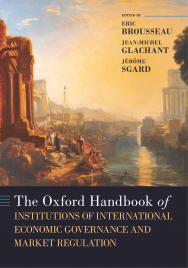
| Auteur(s) |
Eric BROUSSEAU Jean-Michel GLACHANT Jérôme SGARD |
| Type de publication | Ouvrage |
| Référence | Oxford University Press, 2019, review 2025 |
After years of globalizations, as several nations seem to be clinging on identity and domestic economy, one can wonder whether we are witnessing the beginning of a new trend in the global dynamic, or a superficial, emotionally driven political mobilization. These recent evolutions certainly call for a deeper understanding of the institutional drivers of the globalization, as well as of the more recent developments. Understanding the institutional roots of the evolution of the international economic order is the purpose of this book.
The Handbook addresses this complexity through expert analysis and case studies from a multidisciplinary team of economists, sociologists, political scientists, international relations specialists, and historians. The volume is organized around the logic of questioning how international systems of exchange work. It starts, in a first section, by exploring the micro-foundation of cross-border exchange and transnational contracts through analysis of how private ordering, networks of agents, and governments build and regulate (imperfect) markets. Then, on a second part, the challenges of compliance with those regulations is discussed, highlighting how market discipline and judicial sanctions combine, and establish the “rule of law” at the international level. The third section studies governmental initiatives to organize markets and fix market failures in a world characterized by political fragmentation amongst governments and the increasing intervention of non-governmental actors. This leads to explore in a last section, how new modes of law-making, forms of dispute settlement, and vectors of accountability combine to initiate emerging models of governance, which co-exist with traditional ones.
- More about the book
- Link to buy it and get a discount voucher
🎬 Videos:
- Introduction to the Handbook
- Showcasing the Handbook key findings
- In what ways can the handbook inform you about the current challenges facing the global economic order?


























